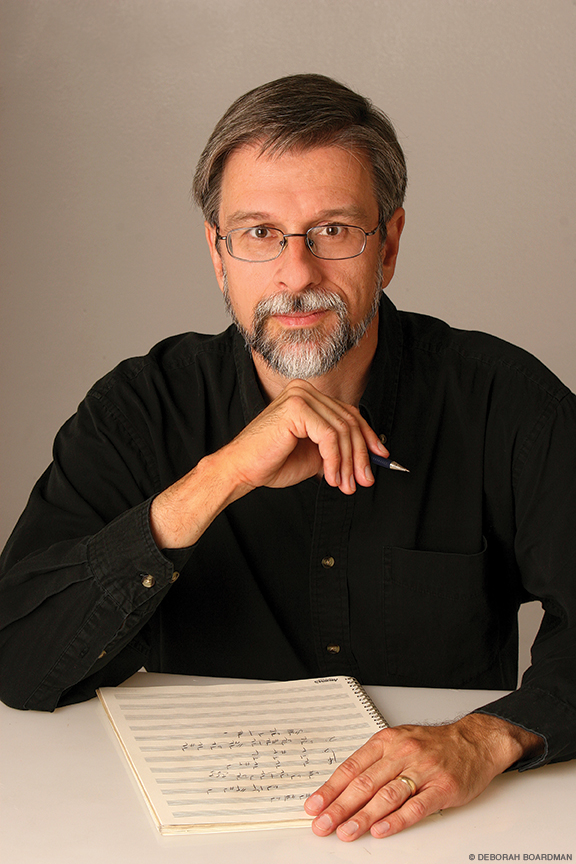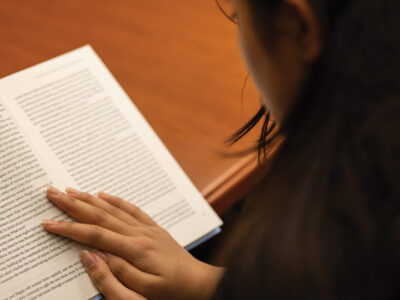
For composer James Primosch, it’s all about the words.
It’s been a slow build over the last 20 years, but this past May, with two new albums out and a recent award added to his bio, music professor James Primosch G’80 realized just how much his work now centers on vocal music.
In fact, he may be realizing it at this exact moment, on the phone, stuck at home due to the coronavirus pandemic. Asked to name highlights from the four decades he’s been a professional composer, starting when he got a master’s in music from Penn and continuing through 32 years (and counting) on the music department faculty, he begins naming specific pieces. Then he pauses.
“It’s funny,” he says, “now that I say those things, I’m realizing the first three career highlights that come to mind all happen to be vocal. So there you go.”
The first half of 2020 is further proof. In February, Primosch won the Virgil Thomson Award for Vocal Music from the American Academy of Arts and Letters. Then in May, two albums with his music came out: Descent/Return features several of his songs for soprano and piano; Carthage is an all-Primosch album, performed by the Grammy-winning chamber choir (and Annenberg Center ensemble-in-residence) The Crossing.
Carthage’s first track, “Journey,” opens with soft, monasterial tones. The text comes from an actual 13th-century monk’s works: “There is a journey you must take,” The Crossing’s male members chant, low and enigmatic. “It is a journey without destination. / There is no map. / Your soul will lead you. / And you can take nothing with you.”
For the album’s title track, “Carthage,” Primosch sets to music an excerpt from Marilynne Robinson’s novel Housekeeping. That piece, along with the album’s centerpiece, “Mass for the Day of St. Thomas Didymus,” are the compositions that Primosch submitted to land his vocal music award in February.
The five-part “Didymus” makes up about half of the album. In it, Primosch interweaves the standard mass text, in Latin, with a set of poems by Denise Levertov that reflect on those same texts. “She’s coming from a place that’s a combination of doubt and faith,” he says.
For “Didymus,” Primosch divides The Crossing into two groups: a set of four soloists who sing the original Latin, and the rest of the choir, which sings Levertov’s words. The result is a back-and-forth, call-and-response, push-and-pull feeling throughout, though by the end the voices have joined together in striking unison.
The pieces on Carthage are all unaccompanied—meaning its music comes solely from human voices, not musical instruments—“so there’s a certain starkness to it,” Primosch says. “But it also makes you appreciate the richness that a group of voices affords. With a cappella choir, there’s kind of a high-wire danger at play there, with a certain self-reliance necessary.”
His compositions on the other new album, Descent/Return, are for solo voice accompanied by piano. There’s a riskiness and vulnerability in that too, Primosch notes, since the singer is alone at the microphone rather than behind an instrument or beside fellow choristers. “There’s also an authority: we’re attending to this particular person at a moment,” he says. “We’re there to hear what she or he has to say.”
Something that both albums share—as do all of Primosch’s vocal pieces, for that matter—is reliance on a source text. In 1999, when the Grammy-winning soprano Dawn Upshaw asked Primosch to write a song cycle that she could perform, he drew on texts from several writers, including poet Susan Stewart Gr’78 CGS’03, who was then teaching in the English department at Penn. Since then, all of Primosch’s vocal compositions have set others’ words into his music.
In that first song cycle for Upshaw, titled Holy the Firm, Stewart’s poem “Cinder” supplied the text for what would become “kind of my greatest hit,” Primosch says—a vocal piece with piano accompaniment that Upshaw brought on tour, and that Primosch has since arranged for both choral and chamber ensembles to perform. In a style that lives somewhere between sultry jazz club tune and operatic aria, “Cinder” opens with these words: “We needed fire to make / the tongs and tongs to hold us / from the flame” and closes with “Tell me, ravaged singer, / how the cinder bears the seed.”
“Things kind of built off of that,” Primosch says of his Holy the Firm song cycle, and especially “Cinder.” “Projects that turned out to be vocal continued to come my way”—including two commissions for the Chicago Symphony Orchestra in 2001 and 2009. “It isn’t so much a conscious choice as good fortune,” he adds.
He’s set both poetry and prose over the years, drawing from writers ranging from Walt Whitman to E.E. Cummings, along with less familiar names. Today Primosch keeps a running file of potential texts to set. “It’s an intuitive, love-at-first sight kind of thing,” he says.
With a text selected, “the large-scale form of the piece will be suggested by the shape—the dramatic arc of the poem or prose,” he says. “The small details, too: the rhythm of a melody will be suggested by the accentuation of the text. I use a naturalistic approach to text-setting—I don’t fragment the text, usually, or write against it. What I’m writing is springing from the text.”
Some questions he ponders are basic: Do these particular words suggest slow or fast music? Should this be the loud part? But while a text’s dramatic arc “may seem like it’s helpful” in composing, Primosch says, “you have to satisfy musical concerns as well.
“Sometimes you hear pieces where the music didn’t add anything,” he continues. “We could have just had somebody recite the poem and that would have been just as interesting as what this composer has done with it.”
In the 40 years since he graduated from Penn, Primosch has had work performed throughout the US and Europe by ensembles including the Los Angeles Philharmonic, the Chicago Symphony, and the St. Paul Chamber Orchestra. On top of his vocal music, he’s written dozens of pieces for non-singers, too, from solo piano to wind ensemble to electronic music. At the same time, he’s taught generations of Penn students music theory, musicianship, and music analysis.
Weeks before the country ground to a halt, Primosch enjoyed a first in his career: a Penn student ensemble performed one of his pieces. The Penn Orchestra played his “Variations on a Hymn Tune” at their February 22 concert—and Primosch was on-hand at both a rehearsal and for the actual performance.
Now all the upcoming concert dates on his well-tended website carry the same addendum: postponed due to the coronavirus crisis. “Of course it’s weird,” he says of these pandemic-afflicted times, in which live performance is thought to be one of the last bits of normal life to resume. “But you keep going. You keep writing. There’s music to be made, one way or another.”
—Molly Petrilla C’06




